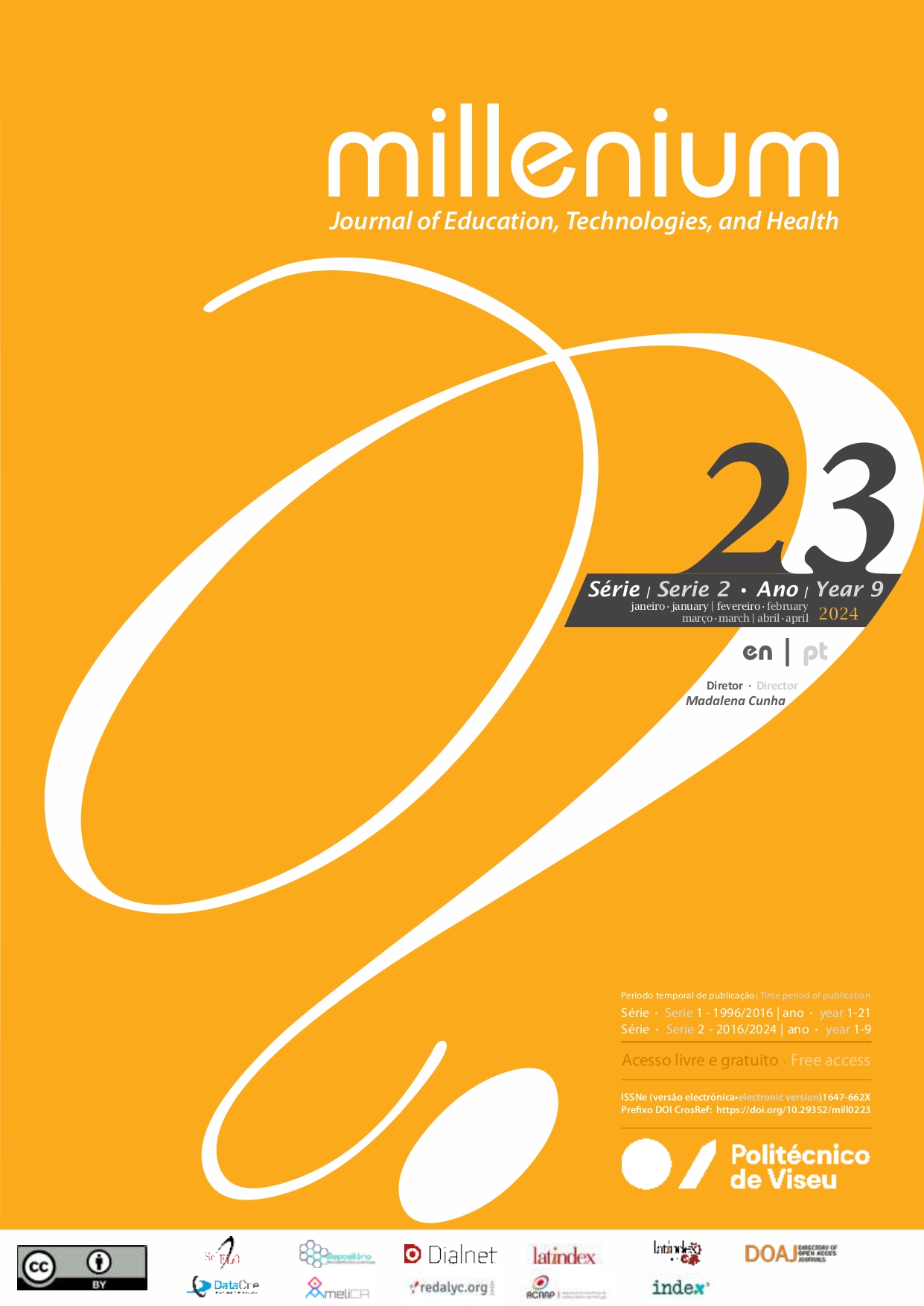Nurses` avoidance of the caregiver empowerment process: perspectives on conditioning factors
DOI:
https://doi.org/10.29352/mill0223.33593Keywords:
patient-centered care; nursing care; patient discharge; informal caregivers; transitionsAbstract
Introduction: In clinical settings, nursing practices are more focused on the dependent person than on the caregiver, which may be related to the complexity of the informal caregiver training process.
Objective: To explore and understand the phenomenon of nurses' avoidance of the informal caregiver training process and identify the underlying factors.
Methods: This is an exploratory and descriptive study with a qualitative approach. Semi-structured interviews were carried out with nine nurses from a central hospital in Portugal. After transcription, content analysis was performed according to Bardin using the NVivo10® software. Ethical requirements were met, and a favorable opinion was obtained from the ethics committee.
Results: Three thematic units emerged that were organized into categories and subcategories: Recognition of the phenomenon (2 categories); Intrinsic factors that condition nurses in training informal caregivers (4 categories and 2 subcategories); and Extrinsic factors that condition nurses in training informal caregivers (6 categories and 6 subcategories).
Conclusion: A comprehensive approach is needed to preparing caregivers, from training nurses to identify and assess caregivers’ needs to coordinating and managing the therapeutic regime and planning for discharge. Healthcare organizations and communities should commit to creating the conditions for caregivers to achieve a healthy and safe transition.
Downloads
References
Albsoul, R. A., FitzGerald, G., Hughes, J. A., & Ahmed Alshyyab, M. (2021). Missed nursing care and complexity theory: a conceptual paper. Journal of Research in Nursing, 26(8), 809–823. https://doi.org/10.1177/17449871211013073
Bardin, L. (2018). Análise de conteúdo (5a ed.). Edições 70.
Cho, S. H., Lee, J. Y., You, S. J., Song, K. J., & Hong, K. J. (2020). Nurse staffing, nurses prioritization, missed care, quality of nursing care, and nurse outcomes. International Journal of Nursing Practice, 26(1), 1–9. https://doi.org/10.1111/ijn.12803
Direção Geral da Saúde. (2022). Documento Técnico para a Implementação do Plano Nacional para a Segurança dos Doentes 2021 |2026. Ministério Da Saúde. Direção-Geral Da Saúde, 1–66. https://www.dgs.pt/qualidade-e-seguranca/seguranca-dos-doentes/plano-nacional-para-a-seguranca-dos-doentes-2021-2026.aspx
Dixe, M. D. A. C. R., & Querido, A. I. F. (2020). Informal caregiver of dependent person in self-care: Burden-related factors. Revista de Enfermagem Referência, 2020(3), 1–8. https://doi.org/10.12707/RV20013
Euro Carers. (2023). Euro Carers. https://eurocarers.org/about-carers/
Fernandes, C. (2014). A família como foco dos cuidados de enfermagem - aprendendo com o family nursing game. [Tese de Doutoramento, Instituto de Ciências Biomédicas Abel Salazar]. https://sigarra.up.pt/icbas/pt/pub_geral.pub_view?pi_pub_base_id=33839.
Grupo Sistemas de Informação e Documentação em Enfermagem - CHUC-SIDE. (2017). Tomada de decisão em Enfermagem no CHUC - O percurso da mudança, 2012-2016 (1ªed. ed.). Centro Hospitalar e Universitário de Coimbra.
Guimarães, A. C., Freitas, L., Costa, S. O., & Brandão, V. (2020). Caring for Carers: Caregiver Assessment Tools. Gazeta Médica, 7(1). https://doi.org/10.29315/gm.v7i1.281
Marques, C. (2015). Capacitar para o cuidado: percepção do cuidador informal da pessoa com acidente vascular cerebral. [Dissertação de Mestrado, Escola Superior de Enfermagem de Coimbra]. https://repositorio.esenfc.pt/rc/
Matos, A. C. (2021). Passagem de turno: contributo para a qualidade na gestão da informação [Dissertação de Mestrado, Escola Superior de Enfermagem de Coimbra]. https://www.oasisbr.ibict.br/vufind/Record/RCAP_9f3189d0fb23403314c1ddd44ed0349f
Meleis, A. I. (2010). Transitions theory - middle range and situation specific theories in nursing research and practice. Springer Publishing Company.
Meleis, A., & Dean, M. (2012). Theoretical Nursing - Development and Progress (Fifth Edit ed.). Wolters Kluwer - Lippincott Williams & Wilkins.
Mizuma, K., Amitani, M., Mizuma, M., Kawazu, S., Sloan, R. A., Ibusuki, R., Takezaki, T., & Owaki, T. (2020). Clarifying differences in viewpoints between multiple healthcare professionals during discharge planning assessments when discharging patients from a long-term care hospital to home. Evaluation and Program Planning, 82(June), 101848. https://doi.org/10.1016/j.evalprogplan.2020.101848
Nunes, M. do C. D., Gonçalves, M. A. R., Vidinha, T. S. dos S., Santos, E. J. F. dos, & CHUC, N. de I. em E. (NIE) –. (2022). El juicio clínico de las enfermeras sobre el empoderamiento del cuidador. Index de Enfermería, 31(3 SE-Originales), 1–5. https://doi.org/10.58807/indexenferm20225152
Petronilho, F. (2007). Preparação do regresso a casa. Formasau - Formação e saúde. https://repositorium.sdum.uminho.pt/handle/1822/32305
Petronilho, F. (2013). A alta hospitalar do doente dependente no autocuidado: decisões, destinos, padrões de assistência e de utilização dos recursos. Estudo exploratório sobre o impacte nas transições do doente e do familiar cuidador. [Tese de Doutoramento, Universidade de Lisboa]. https://repositorio.ul.pt/bitstream/10451/10572/1/ulsd067227_td_Fernando_Petronilho.pdf
Rego, A., & Coelho, P. (2016). Organizar a Prestação de Cuidados Por “Enfermeiro de Referência” Promove a Qualidade. Servir, 59(5–6), 68–75. https://doi.org/https://doi.org/10.48492/servir025-6.23469.
Shibily, F. M., Aljohani, N. S., Aljefri, Y. M., Almutairi, A. S., Almutairi, W. Z., Alhallafi, M. A., Alsharif, F., Almutairi, W., & Badr, H. (2021). The perceptions of nurses and nursing students regarding family involvement in the care of hospitalized adult patients. Nursing Reports, 11(1), 133–142. https://doi.org/10.3390/nursrep11010013
Downloads
Published
How to Cite
Issue
Section
License
Copyright (c) 2023 Millenium - Journal of Education, Technologies, and Health

This work is licensed under a Creative Commons Attribution 4.0 International License.
Authors who submit proposals for this journal agree to the following terms:
a) Articles are published under the Licença Creative Commons (CC BY 4.0), in full open-access, without any cost or fees of any kind to the author or the reader;
b) The authors retain copyright and grant the journal right of first publication, allowing the free sharing of work, provided it is correctly attributed the authorship and initial publication in this journal;
c) The authors are permitted to take on additional contracts separately for non-exclusive distribution of the version of the work published in this journal (eg, post it to an institutional repository or as a book), with an acknowledgment of its initial publication in this journal;
d) Authors are permitted and encouraged to publish and distribute their work online (eg, in institutional repositories or on their website) as it can lead to productive exchanges, as well as increase the impact and citation of published work
Documents required for submission
Article template (Editable format)





